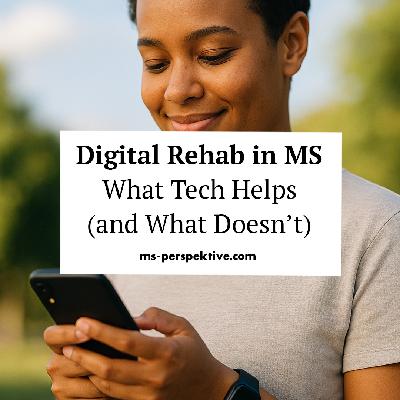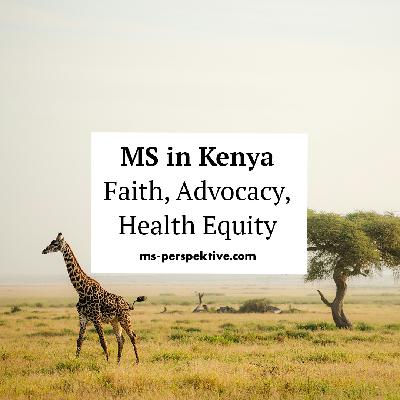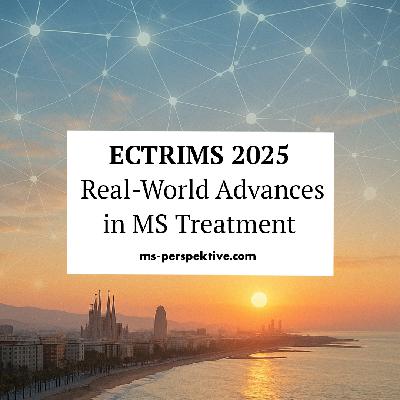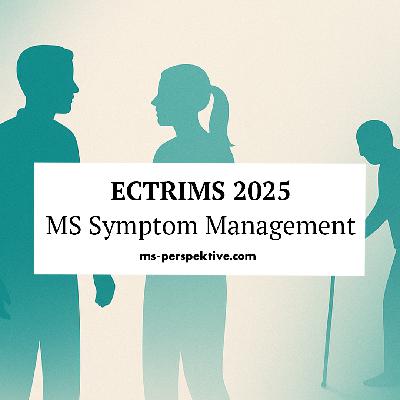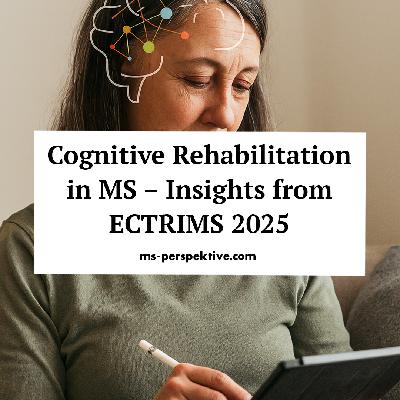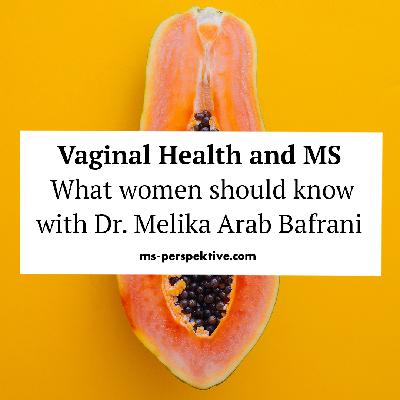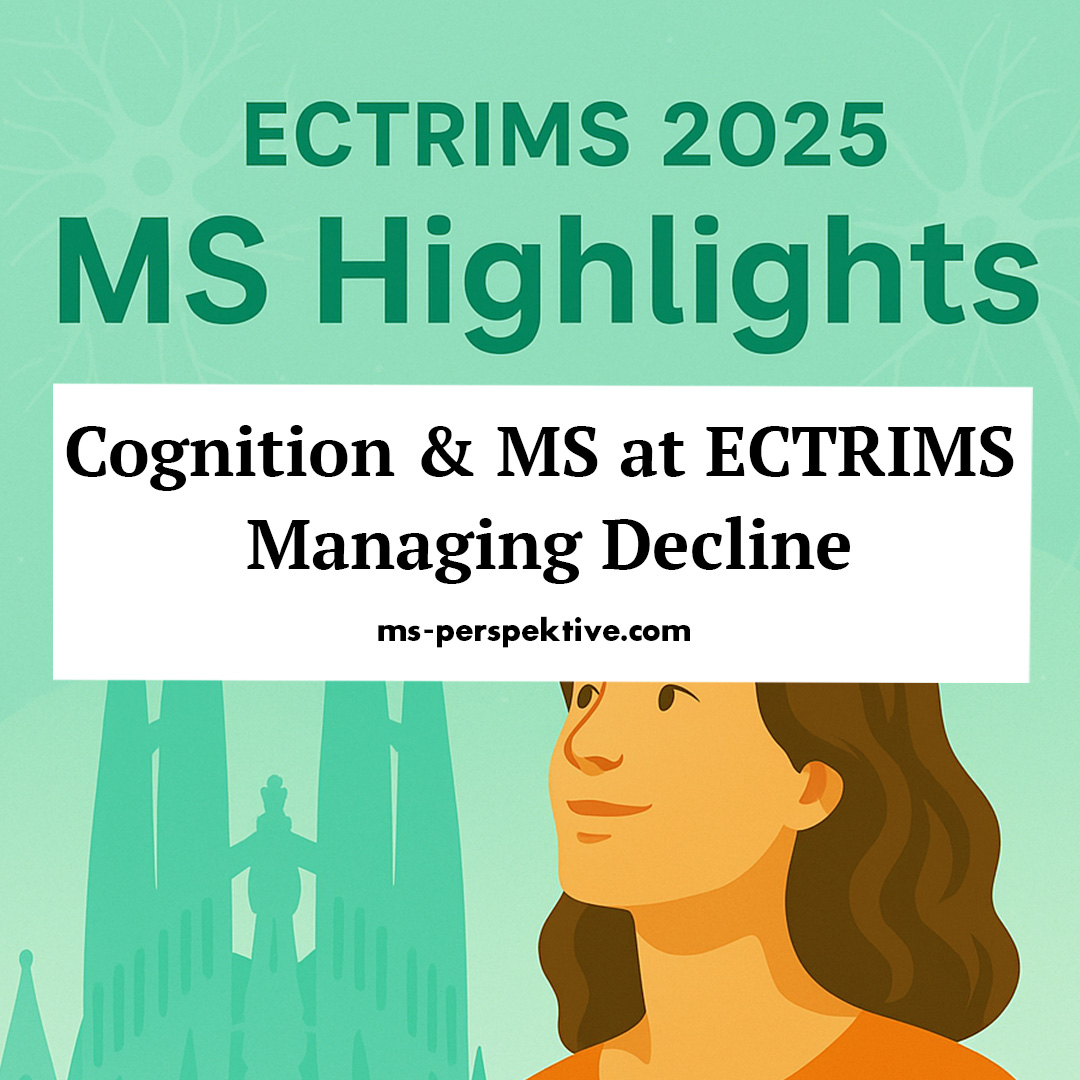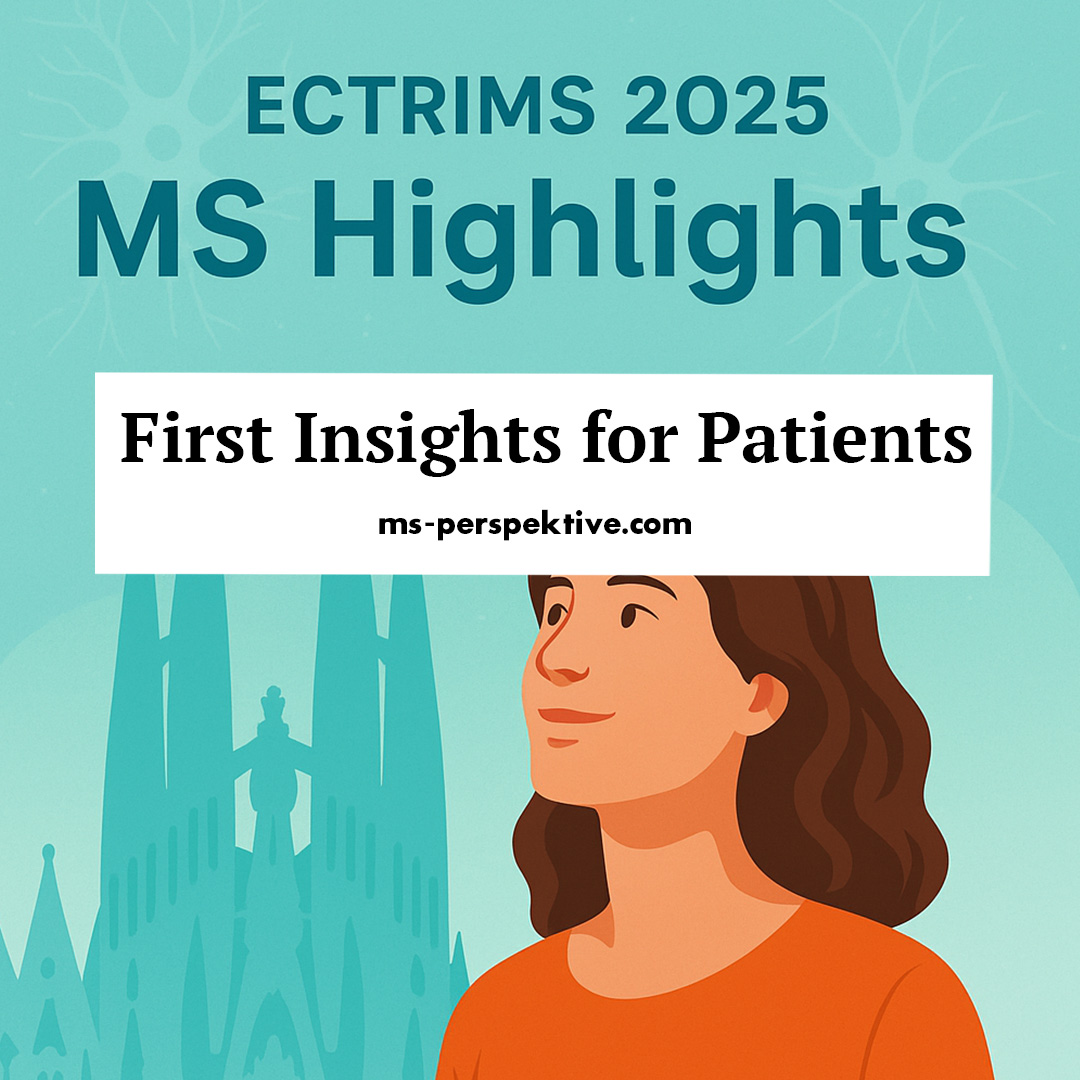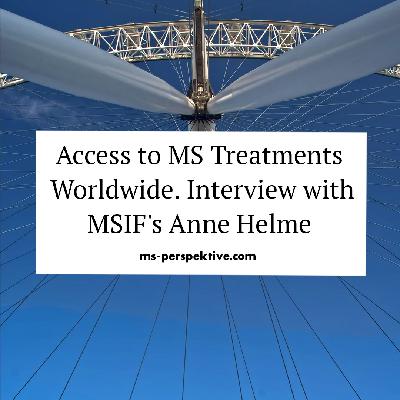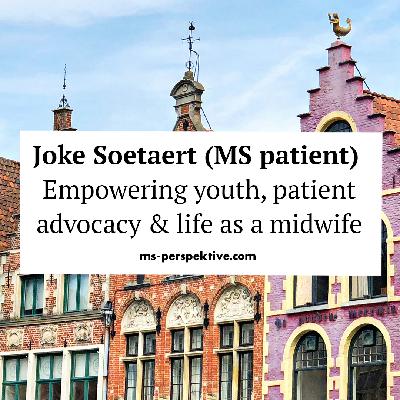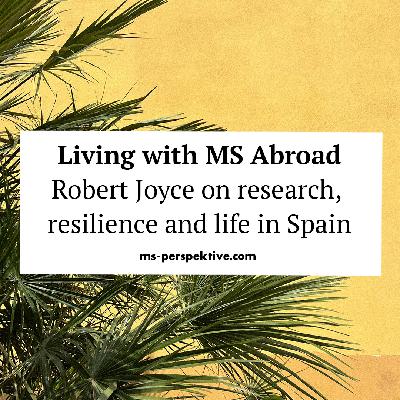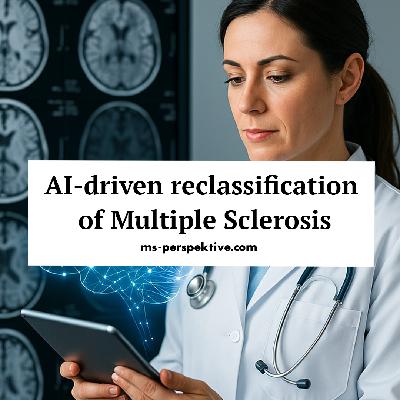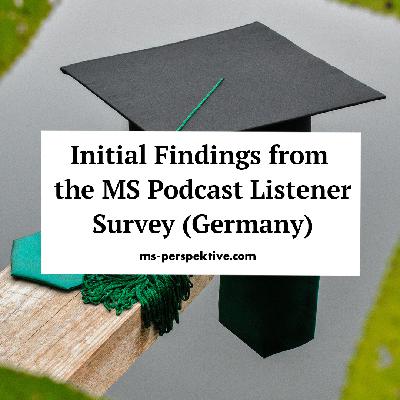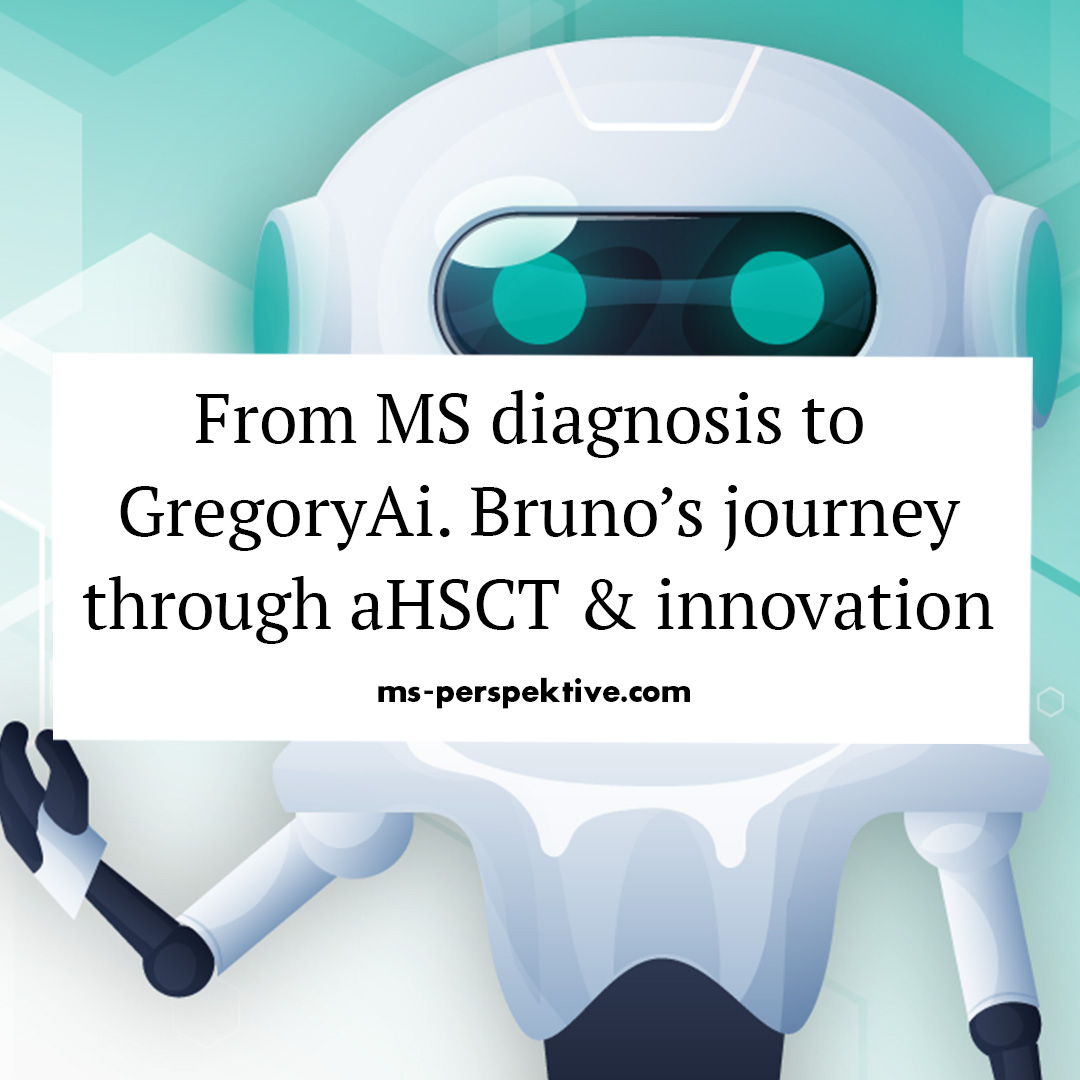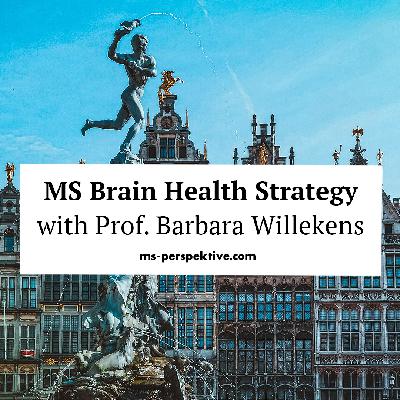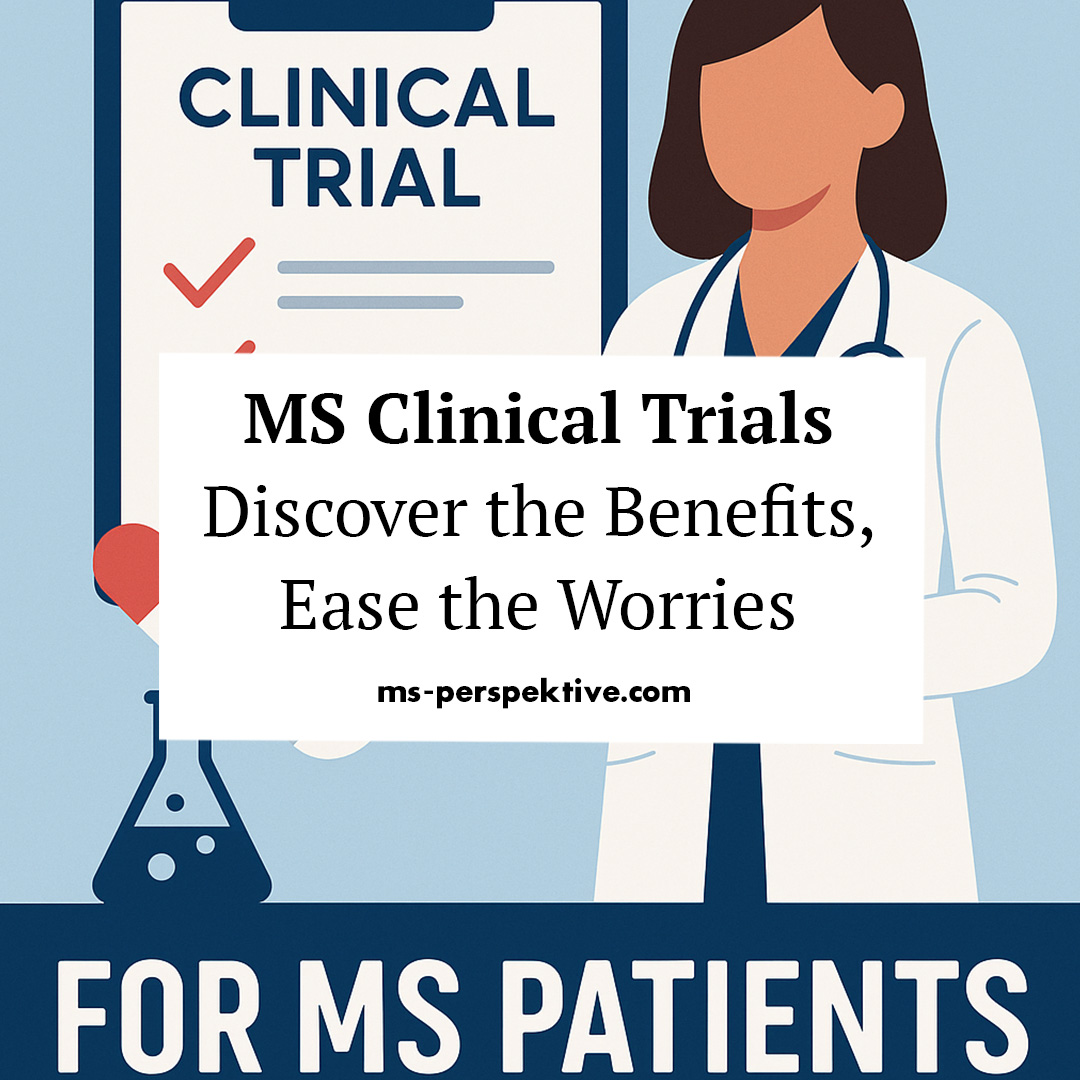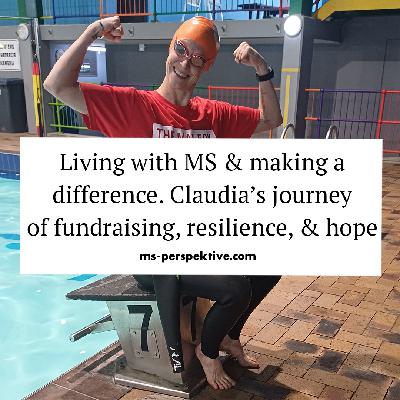Discover MS-Perspektive - The Multiple Sclerosis Podcast
MS-Perspektive - The Multiple Sclerosis Podcast

MS-Perspektive - The Multiple Sclerosis Podcast
Author: Nele von Horsten
Subscribed: 15Played: 162Subscribe
Share
© 2023-2025
Description
In the MS-Perspektive Podcast, I present my view of multiple sclerosis and show you how you can make the best of the diagnosis. Because a beautiful and fulfilling life is also possible with multiple sclerosis.
Here you will find information and strategies on how you can actively influence your course. In addition, I publish solo articles with my experiences, interview experts and on various topics related to living with MS as well as other affected people. In addition, there are a few episodes that serve the relaxation, positive attitude and stimulation.
Here you will find information and strategies on how you can actively influence your course. In addition, I publish solo articles with my experiences, interview experts and on various topics related to living with MS as well as other affected people. In addition, there are a few episodes that serve the relaxation, positive attitude and stimulation.
144 Episodes
Reverse
Maybe you already use your phone, a wearable, or one of the many MS-related apps to track your symptoms or support your daily routines. But when it comes to rehabilitation, the real question is: which digital tools actually help — and which ones are just noise? In this ECTRIMS session, researchers from around the world explored how technology can enhance rehabilitation for people with MS. Their message was clear: digital tools can open new doors, but only when they are designed well, grounded in science, and truly support your everyday life. You can read through the complete article here: https://ms-perspektive.de/EN/142-digital-rehab In this episode, you'll hear about: 1. Alon Kalron – Israel How digital technologies—from smartphones to sensor-based rehab tools—can extend what your rehab team can see and support between appointments. 2. Andrea Tacchino – Italy Why digital outcome measurements matter, how sensors can capture real-life changes, and what it takes to turn raw data into meaningful digital biomarkers. 3. Gabriele Perachiotti – Italy How high-intensity, task-oriented circuit training can improve balance, fatigue, and quality of life—even in people with severe mobility limitations—and how a simple home-based telerehab setup helps maintain progress. 4. Andrea Baroni – Italy How machine-learning models can predict rehab outcomes and why your starting functional level is the strongest predictor of future improvement. 5. Diogo Haddad Santos – Brazil Why "strange" visual symptoms in MS often reflect real, measurable eye-movement changes—and how portable eye-tracking may become a new digital biomarker. 6. Katrin Parmar – Switzerland Which balance tests reflect high-tech lab measurements, and why static and dynamic balance need to be tested separately. Topics we explore: The promise and limits of MS apps & wearable sensors Digital biomarkers for gait, balance, fatigue, and vision Task-oriented training and telerehabilitation Predicting rehab outcomes using machine learning Eye-tracking and the hidden world of visual symptoms Static vs. dynamic balance: why both matter How to decide which digital tools are worth your time What you'll take away: Not every digital tool is useful — evidence and usability matter. Sensors can capture changes that clinic visits miss. Even with higher disability, meaningful rehab gains are possible. Your starting function strongly shapes your rehab journey. Subjective symptoms (like visual strain) deserve objective investigation. The future of MS rehab is a blend of clinic + lab + digital. --- See you soon and try to make the best out of your life, Nele For more information and positive thoughts, subscribe to my newsletter for free. Click here for an overview of all podcast episodes published so far.
👉 For a full deep-dive into this conversation, including all details, quotes, links and context, please visit the accompanying blog article on https://ms-perspektive.com/141-kenya. MS in Kenya is likely severely underdiagnosed. The Atlas of MS lists only around 200 known cases in a country of almost 58 million people — yet access to neurologists, MRI scans and specialist care is extremely limited, especially in rural regions. Many families must prioritise basic needs like food over long and costly medical journeys, leaving countless people undiagnosed. In some communities, MS-like symptoms are still linked to witchcraft, leading to stigma, social exclusion or even abandoned marriages. In this episode, Rev. Kipchirchir Kigen — reverend, public health practitioner and advocate — explains why MS remains largely invisible in Kenya and how he works with religious leaders and communities to replace fear with understanding. He also shares his own long journey with neurological symptoms, misdiagnoses and the struggle to access care. We discuss: Why MS is likely far more common in Kenya than official numbers suggest What the journey to diagnosis looks like in a low-resource setting How stigma and misconceptions affect people with neurological symptoms The role of churches and community leaders in creating awareness Rev. Kigen's personal story of uncertainty, resilience and advocacy What needs to change in Kenya's health system to improve MS care Mentioned resources: Atlas of MS MS organisations and foundations in Kenya Global MS community & MS International Federation "Understanding MS" online course (Menzies Institute, Tasmania) --- For more information and positive thoughts, subscribe to my newsletter for free. Click here for an overview of all podcast episodes published so far.
In this episode, I take you behind the scenes of ECTRIMS 2025 and explore seven fascinating studies that show how multiple sclerosis (MS) care is evolving — from safety monitoring and infection risks to data-driven, personalized treatment decisions. You'll learn about: How often late-onset neutropenia occurs in people on Rituximab and who's most at risk. What factors increase the chance of serious infections with Ocrelizumab. Why early high-efficacy treatment leads to better long-term outcomes across four countries. What happens to memory B cells during long-term Ocrelizumab therapy and what that means for extended dosing intervals. What the FAERS database tells us about tumor signals and why HPV vaccination remains essential for women with MS. How real-world data from the TEMPOS study (France) reveal a massive shift toward anti-CD20 therapies — especially Ofatumumab. And finally, how a new AI-based prediction tool helps estimate individual risk when stopping a DMT. 🎯 Main takeaway: MS treatment is moving toward earlier, stronger, and more personalized approaches — guided by real-world evidence and smart technology. 👉 You can read the full article with all study details, numbers, and takeaways here: https://ms-perspektive.de/en/140-ectrims-rwe --- See you soon and try to make the best out of your life, Nele For more information and positive thoughts, subscribe to my newsletter for free. Click here for an overview of all podcast episodes published so far.
🧠 Episode Summary The new 2024 McDonald Criteria for diagnosing multiple sclerosis (MS) mark an important milestone: doctors can now confirm MS earlier and with greater confidence, allowing treatment to start sooner and potentially improving long-term outcomes. In this episode, we explore what has changed since the 2017 version, why these updates matter, and how they affect people living with — or at risk of — MS. 📋 Key Points Covered What the McDonald Criteria are and why they matter The biggest updates in 2024 – including the role of CSF (oligoclonal bands) How Radiologically Isolated Syndrome (RIS) may now count as MS in some cases Why early diagnosis can make a real difference in the course of the disease When people with CIS or RIS should consider speaking with their neurologist again 🔍 For Listeners Living With MS or Early Symptoms If you've previously been told you have a Clinically Isolated Syndrome (CIS) or Radiologically Isolated Syndrome (RIS), it may be worth revisiting your diagnosis. The new criteria might change your status — and early treatment could help protect your long-term health. Always discuss any concerns or new information with your neurologist. 💻 Read the Full Blog Article You can find a detailed written version of this episode, including background information and visual explanations, here: 👉 Read the full article on MS-Perspektive.de: https://ms-perspektive.de/en/139-2024-mcdonald-criteria 📚 Scientific Reference Based on: International Panel on the Diagnosis of Multiple Sclerosis (2024). Diagnosis of multiple sclerosis: 2024 revisions of the McDonald criteria. Published in The Lancet Neurology, October 2025. ❤️ Takeaway Message Earlier diagnosis means earlier action. The 2024 McDonald Criteria are designed to give people with MS a clearer, faster path to the right treatment — and a better outlook for the years ahead. --- See you soon and try to make the best out of your life, Nele For more information and positive thoughts, subscribe to my newsletter for free. Click here for an overview of all podcast episodes published so far.
In this episode, we explore key insights from the ECTRIMS 2025 session "Symptoms and Symptom Management". Four young researchers share findings that go beyond MRI scans and lab data — focusing on what truly matters in daily life with MS. 🧠 Andreas Kirknæs Færk examined how symptoms cluster and evolve over time. 📊 Sean Apap Mangion showed how patient-reported outcomes can predict disease progression. 💼 Mathia Kirstein explored symptom-related risk factors for early retirement. 💊 Marie Mainguy highlighted inequalities in access to symptomatic treatments across France. Together, their work reminds us that MS care must be holistic — addressing physical, cognitive, and emotional health, as well as fair access to therapy. Listen in to learn: Which symptoms tend to occur together and why that matters How self-reported data can signal early changes in MS What factors lead to early retirement in people with MS Why access to treatment for spasticity and walking impairment remains uneven How young scientists are shaping the future of MS research For more details and resources, visit 👉 https://ms-perspektive.com/138-symptom-management ✨ Closing Thoughts These studies not only advance scientific understanding — they also reflect the dedication and creativity of a new generation of researchers who are deeply attuned to the real-world challenges faced by people with MS. Their work reminds us that progress in MS care depends as much on empathy and collaboration as it does on data and technology. --- See you soon and try to make the best out of your life, Nele For more information and positive thoughts, subscribe to my newsletter for free. Click here for an overview of all podcast episodes published so far.
In this episode, we dive into five innovative rehabilitation studies presented at ECTRIMS 2025. From the validation of digital assessments to family-centered care and home-based rehabilitation, these studies offer promising insights for people living with MS. Whether you're a patient, caregiver, or healthcare professional, this episode highlights tools and approaches that can improve quality of life, independence, and symptom management. 📰 Prefer reading instead? 👉 Check out the full blog article with all study summaries here: https://ms-perspektive.com/137-rehab-ectrims 🧠 Poster Summaries 1. Robot-based assessment of motor-cognitive dual-task abilities in unimpaired adults Authors: E. Misley et al. Summary: This study validated the use of "hunova" – a robotic platform that integrates digital cognitive tests with motor tasks – in healthy adults. Results: Strong correlations with traditional tests, faster performance digitally, and high agreement between test types suggest this tool could be valuable in MS for real-time, objective, and combined motor-cognitive assessments. Evidence Level: Early validation study (Level III – non-randomized). Why it matters: Digital cognitive-motor testing could offer a faster, scalable way to detect subtle impairments in MS. 2. Evaluating Inpatient Rehabilitation at a National MS Centre in Norway Authors: Gunnes, M. et al. Summary: A structured assessment of inpatient rehabilitation outcomes across multiple domains (QoL, fatigue, self-efficacy, symptoms). Results: Significant improvements in symptom burden, QoL, and function from admission to discharge and 6 weeks post-discharge. Some relapse after discharge indicates the need for continued support. Evidence Level: Level II (observational, real-world data). Why it matters: Inpatient rehab clearly benefits MS patients, but ongoing follow-up is crucial to maintain gains. 3. Combining Home-Based Digital Telerehabilitation with In-Hospital Therapy in Progressive MS Authors: Gandolfi M. et al. Summary: Participants with progressive MS received both in-hospital sessions and 12 weeks of digital telerehabilitation. Results: Although primary motor outcomes did not show significant differences yet, patient satisfaction and acceptability of the digital program were very high. Evidence Level: Level II (well-designed RCT, small sample). Why it matters: A hybrid rehab model could become a scalable, patient-friendly long-term approach, especially for those with limited access to clinics. 4. Effectiveness of MS Centers vs. General Healthcare in Improving QoL Authors: E. Grigoriadou et al. Summary: Compared outcomes in patients treated at MS Centers versus general healthcare settings. Results: MS Center patients had faster diagnoses, better MRI access, fewer delays, and higher satisfaction scores, with less anxiety and pain. Evidence Level: Level III (observational cohort). Why it matters: MS Centers offer significantly better coordinated care, impacting everyday wellbeing and disease progression. 5. Digital Resource Development for MS Family Caregivers (DigiTRAC Study) Authors: Afolasade Fakolade et al. Summary: A co-creation study involving caregivers and service providers to design an ideal digital support platform. Results: Top priorities were ease of use, MS treatment info, and emotional wellbeing tools. Respondents emphasized the need for multimedia content and accessible tech. Evidence Level: Level IV (qualitative + survey-based design). Why it matters: Well-designed digital resources could reduce caregiver burden and improve resilience for families supporting MS patients. 💡 Key Takeaways for People with MS: Digital tools are becoming more validated and practical for cognitive and motor rehab. Inpatient rehab works, but consistent follow-up is needed. Home-based hybrid models offer flexibility and satisfaction. Where you get care matters—MS Centers outperform general care. Supporting caregivers is crucial for the whole care ecosystem. -- See you soon and try to make the best out of your life, Nele For more information and positive thoughts, subscribe to my newsletter for free. Click here for an overview of all podcast episodes published so far.
In this episode, I explore five exciting studies from ECTRIMS 2025 that reveal how cognitive training, mindfulness, and smart rehab planning can support brain function and independence in people with MS. You can read the text version here: https://ms-perspektive.com/136-cognitive-rehab Cognitive changes affect a large percentage of people with multiple sclerosis—yet they often remain invisible or unspoken. This episode focuses on new, science-backed strategies to strengthen thinking skills, reduce stress, and even promote brain reorganization. 🧠 What's inside: I highlight 5 research posters presented at ECTRIMS 2025: Digital brain training boosts memory and reshapes brain activity. Multisensory integration improves with targeted cognitive exercises. Mindfulness-based group programs reduce fatigue, anxiety, and stress. Goal setting in rehab matters – and needs to be measurable. Digital testing may detect early cognitive decline, even remotely. 💡 These findings offer practical insights into how non-pharmacological interventions can support everyday life with MS. 📚 Referenced Studies All posters were presented at the ECTRIMS 2025 Congress. For detailed summaries, check out the blog post: https://ms-perspektive.com/136-cognitive-rehab --- For more information and positive thoughts, subscribe to my newsletter for free. Click here for an overview of all podcast episodes published so far.
In this insightful episode, I talk with Dr. Melika Arab Bafrani, postdoctoral researcher at the University of California, San Francisco (UCSF), about a topic that deserves far more attention — vaginal health and MS. MS affects not only the nervous system but also the immune balance of the whole body, including intimate areas. Dr. Bafrani explains how disease-modifying therapies (DMTs) can alter the vaginal and urinary microbiome, why collaboration between neurologists and gynecologists is vital, and what warning signs women with MS should never ignore. We also discuss: How DMTs can influence the vaginal environment Early symptoms of imbalance or infection to look out for Daily habits and preventive care for intimate well-being Research gaps and why women's participation in studies is so important How personalized medicine could shape the future of MS treatment Whether you're newly diagnosed or have lived with MS for years, this episode helps you better understand how intimate health connects to your overall MS journey. 📝 Read the full blog article with all questions and answers here: https://ms-perspektive.com/135-vaginal-health
In this solo episode from ECTRIMS 2023, I share the highlights from the inspiring lecture by Prof. Maria Pia Amato on cognition and multiple sclerosis. Cognitive changes are common in MS and affect nearly half of all patients – from attention and memory to language and executive function. You will learn: How cognitive impairment appears across the MS spectrum (including CIS, RIS, pediatric MS, and aging). Why regular cognitive screening matters and which tools are recommended. Insights into the underlying mechanisms of cognitive decline. The role of cognitive reserve and lifestyle in protecting brain health. Management approaches from DMTs to cognitive rehabilitation and digital tools. Future directions in MS research and patient care. Cognition is increasingly recognized as a core focus in MS care. This episode explains why – and what you can do about it. 👉 Mentioned researchers and papers will be linked on the blog which you can find here: https://ms-perspektive.com/134-ectrims-2 --- See you soon and try to make the best out of your life, Nele For more information and positive thoughts, subscribe to my newsletter for free. Click here for an overview of all podcast episodes published so far.
Read the full blog article here: ms-perspektive.com – ECTRIMS 2025 MS Highlights ECTRIMS 2025 MS Highlights: First Insights for Patients ECTRIMS is the world's largest MS conference, and in 2025 it takes place in Barcelona. Thousands of researchers and clinicians share the newest findings on multiple sclerosis. In this episode, we look at the first highlights from the press releases: Early biomarkers for silent progression (PIRA) How menopause may influence MS and comorbidities The role of ultra-processed foods in relapses and MRI lesions Environmental risk: pediatric ozone exposure Ocrelizumab's strong relapse control—and its limits against progression Learn what this research could mean for you, why statistical significance isn't always clinical significance, and why these insights matter for the future of MS care. More iformation on: ectrims.eu/ectrims2025/ See you soon and try to make the best out of your life, Nele For more information and positive thoughts, subscribe to my newsletter for free. Click here for an overview of all podcast episodes published so far. 🔗 References For those who would like to dive deeper, here are the scientific abstracts presented at ECTRIMS 2025: PIRA biomarkers – Landwehr A., et al. Proteomic Signatures of PIRA: Distinct proteins in cerebrospinal fluid are associated with progression independent of relapse activity in multiple sclerosis. ECTRIMS 2025, Barcelona. Menopause and MS – Şimşek SY. Impact of Menopause on Initial Clinical Presentation and Comorbidities in Women with Multiple Sclerosis: A Comparative Study with Age-Matched Men. ECTRIMS 2025, Barcelona. Ultra-processed foods – Dalla Costa G. Association of Ultra-Processed Food Intake with Increased MS Disease Activity: Findings from the BENEFIT Trial. ECTRIMS 2025, Barcelona. Pediatric ozone exposure – Pugliatti M., Bergamaschi R., Pilotto A., Ghezzi A., et al. Exposure to ozone is associated with an increased risk of pediatric multiple sclerosis (pedMS): the PEDIGREE study. Abstract IMS25-LBA-176. ECTRIMS 2025, Barcelona. Ocrelizumab – Roos I. Real-world effectiveness of ocrelizumab in multiple sclerosis: a multi-registry observational cohort study. ECTRIMS 2025, Barcelona.
Access to MS treatments worldwide remains highly unequal. While research and innovation are making great strides, many people with multiple sclerosis are not benefiting from these advances. In this episode, Anne Helme, Head of Research and Access at the MS International Federation (MSIF), talks about the global challenges of treatment access, MSIF's work to address them, and the hopes for a fairer future in MS care. We cover: Why a global approach to access is more important than ever Where access to modern MS therapies is most limited The biggest barriers: cost, availability, regulations, and information gaps How MSIF and its members are working to improve access worldwide Options for patients in countries with limited or unaffordable treatments Developments that bring hope for the future 👉 Read the full blog article: Access to MS Treatments Worldwide – Interview with MSIF's Anne Helme - https://ms-perspektive.com/132-anne-helme 👉 Learn more about MSIF's work on access and advocacy: MSIF – Access to MS healthcare - https://www.msif.org/access-to-ms-healthcare/ --- A big thank you to Anne Helme and all her colleagues for everything they have reached already for the wordlwide MS community. See you soon and try to make the best out of your life, Nele For more information and positive thoughts, subscribe to my newsletter for free. Click here for an overview of all podcast episodes published so far.
👉 Read the full blog article here: https://ms-perspektive.com/131-joke-soetart In this inspiring interview, Belgian midwife and patient expert Joke Soetaert shares how her 2019 MS diagnosis became a catalyst for growth, advocacy, and community. She talks about mindset, research participation, empowering young people with MS, and why patient voices belong at every table. Overview of topics Joke's MS diagnosis in 2019 and first symptoms Mindset, lifestyle and work changes Participation in more than 10 MS studies Why patient voices matter in research and care Empowering youth with MS at MS-Liga Vlaanderen Insights from ECTRIMS & EMSP conferences Prevention, comorbidities, and resilience Hopes for precision medicine and the future Before the Interview ✨ Discover more inspiring patient stories and expert interviews on MS-Perspektive Blog: https://ms-perspektive.com/blog📬 Stay updated and receive tips, stories, and news directly in your inbox – sign up for the MS-Perspektive Newsletter: https://ms-perspektive.com/newsletter Complete Interview 1. Personal Journey & MS Diagnosis Can you introduce yourself and tell us a bit about your work as a midwife? Joke: I'm really grateful that you thought of me, and I'm so happy to be part of this podcast. So hello, my name is Joke Soetaert and I am 33 years old. I live in Belgium and I work as a midwife. Most of the time I take care of premature and sick babies, but I also work on the maternity ward with mothers who have just given birth and their newborns, pregnant women and women recovering from gynecological surgery. How did you experience the moment of your MS diagnosis in 2019, both personally and professionally? Joke: Well, it actually started about nine months earlier. In the summer of 2018, I was about to change jobs. I was working in a large hospital in the surgical theatre, and after five years I was finally going to follow my dream of working as a midwife. Just before that change, I had an episode of optic neuritis. The neurologist told me that I had a higher risk of developing MS and suggested regular follow-up at neurology. So nine months later, I was settling into my new job. I had just finished four very busy night shifts. After the last one, I felt a slight numbness in my fingertips. The neurologist had told me that almost any symptom could be linked to MS, so of course it crossed my mind. But I didn't really believed it, I was still in denial. The next morning, I woke up with the same feeling in the fingers of my other hand. That could no longer be a coincidence. I contacted my neurologist, and very quickly I was admitted, so both MRIs, brain and spinal cord were planned, along with other tests. On Monday I was admitted, and the first MRI was of my spinal cord. It already showed a fairly large white matter lesion. Because of that, I received the diagnosis of MS the same afternoon. It felt like the ground disappeared beneath my feet … People often say that after receiving a serious diagnosis, you only remember a small part of what the doctor tells you. I can definitely confirm that. The next day, the brain MRI turned out to be completely normal, I had no lesions. I also began another round of corticosteroids, three infusions. I was allowed to go home during the day because in my hospital the infusions are given at night. So two days after my diagnosis, I was with my boyfriend. We were in a relationship of about one and a half year. He suddenly told me that he couldn't handle it anymore. He said he was afraid of the future, especially of the idea that I might end up in a wheelchair. It came completely out of nowhere. That actually overshadowed the diagnosis itself. For me, this was much worse. My whole future fell apart, and I had to completely rethink what my life would look like. It was very intense. I wanted to return to work right away, mostly for distraction and to be with my colleagues. But my neurologist gave me two weeks of sick leave. She called it "bereavement leave." That week, on Friday, I had a resuscitation training course at a university hospital, and I didn't want to miss that. But it turned out to be too much; the long hours of standing, listening, concentrating, not sleeping enough, not eating enough during the last 5 days. I fainted. Luckily, I was surrounded by anesthesiologists, emergency doctors, midwives, and nurses, so I was in the best hands. But it showed me how important it is to take some time to recover. What changed the most for you after being diagnosed – in your mindset, your lifestyle, or your approach to work? Joke: Wow, a lot changed for me after my diagnosis. Before, I was kind of… lazy. I didn't really have a clear goal in life. I just made sure I could get through each day, but my free time wasn't really dedicated to anything. I knew it was healthy to move and exercise, but it didn't happen very often. After my diagnosis, of course, I immediately started reading some scientific articles about exercise, mindset, nutrition, sleep, stress and all those things. And that helped me shift very quickly. During the two weeks of "bereavement leave," I already started thinking about what I could do with this new reality. I quickly realized I didn't have fatigue or really limiting symptoms, so I started gathering knowledge immediately. And now, six years later, I can say that I try very hard to make a difference for myself in all these areas. The overarching factor, of course, is mindset. I was able to step out of the victim role quite quickly, which is often not easy. By looking at it from a different perspective, I could even see very early on the opportunities that my MS diagnosis could bring. A few months later, I already started thinking about how I could find a place in the MS world, how I could be meaningful, not just for myself, by gaining more knowledge, feeling better, and meeting peers, but also for the wider MS community. At work, I felt very supported by my colleagues. I think it also helped that they work in the medical field. They asked thoughtful questions, which I really appreciated. After those two weeks, I returned to work in the neonatal unit. I had to lift a baby and I told my colleague, "Wow, thankfully I'm in the neonatal unit, because here you only lift half of the weight of healthy newborns!" That was my first joke, and it set the tone. I often made jokes about it at first, and after a while, it didn't really matter anymore and it didn't occupy my mind as much. But that was very important in my process, giving myself, and my colleagues, the space to talk about it. How did your medical background influence the way you understood and processed your diagnosis? Joke: Yes, in my eyes, it had a huge impact. Normally, I like to know everything, especially about a topic I understand or that's my area of expertise. But leading up to my MS diagnosis, when I was considered at risk, I didn't look much into it because I was convinced I wouldn't get it. I was absolutely certain of that. Of course, I was completely wrong, and the diagnosis really hit me hard. But I picked myself up and immediately started reading and learning. Because I could grasp the knowledge fairly easily, I quickly had space to explore the psychological side of processing a diagnosis. We can actually speak of it as a kind of living loss, it's a loss of the life you knew until that moment, a life without worries in that area. And you don't expect that you'll need to make adjustments or be flexible in certain parts of your life. Now, six years later, it turns out that it hasn't really been the case at all in my situation. I haven't had to make any adjustments. I still work full-time, early mornings, days, evenings, and night shifts, including weekends and holidays. And those can be very tough, but that's the case for all my colleagues. So I don't really experience any extra burden. Even in terms of sports and physical activity, I've actually improved, I used to do almost nothing, and now I exercise a lot. Since my diagnosis, I also took on several challenges: we climbed part of Mont Blanc, I ran a half marathon, and I walked 80 kilometers, the entire Belgian coastline in just one day. And my mindset has evolved enormously, which I find very fascinating and I am very grateful for that. 2. Patient Expert & Scientific Involvement You've been involved in scientific research since 2019. What has it been like to participate so actively in MS-related studies? Joke: Yes, that's correct. While I was looking up information about MS, I came across some scientific studies that I was eligible to participate in, and I jumped in without hesitation. The first study was about walking fatigue, and it went really well. The researcher was very kind and immediately made me feel comfortable, and that's basically how it continued. So far, I've participated in more than ten studies, and it's always been a very positive experience because of the great contact with the researchers. They are passionate people, and we shared that enthusiasm. I was also able to help them connect with other people with MS, and I was always very interested in everything behind the studies, including the results afterwards. I find that very fascinating. I've taken part in studies in Belgium and also in the Netherlands. I definitely recommend it. You get to see your own results, but also the group results and the differences within the group, often comparing people with MS to healthy control groups. In some studies, you also get the chance to try out different kinds of equipment, which is very interesting. How does being both a patient and part of scientific projects shape your view of MS? Joke: Being so involved in scientific research and participating in these studies gave me a really good feeling right away. It showed me that many researchers are working on MS every single day. A large group is looking for new and better treatments, but in my case, the studies were always about the i
What does it mean to live with MS abroad? In this inspiring interview, I speak with Robert Joyce, MS patient, blogger at A 30 Minute Life, and strong advocate for patient involvement in research. Robert shares his journey from diagnosis at 23 to moving from Ireland to Spain for health reasons. We talk about the impact of climate, differences between Spanish and Irish healthcare, coping with chronic pain, and why patient voices are essential in research. He also gives us a glimpse into his hopes for the future of MS care and personalized medicine. Topics we cover: Robert's MS diagnosis and turning points Why he started A 30 Minute Life Life with MS in Spain: climate, healthcare, culture Coping strategies for chronic pain and mental health The power of patient voices in research Hopes for personalized medicine and patient advocacy Links & Resources: Blog: https://a30minutelife.com/ Connect with Robert on LinkedIn 👉 You can also find a written summary of this interview on my blog: https://ms-perspektive.com/130-robert-joyce — perfect if you prefer reading or want to revisit the highlights. --- See you soon and try to make the best out of your life, Nele For more information and positive thoughts, subscribe to my newsletter for free. Click here for an overview of all podcast episodes published so far.
Neural stem cells may calm brain inflammation and enable myelin repair in progressive MS. Safety looks promising; phase-2 planning is underway. You can read the interview extract on my blog: https://ms-perspektive.com/129-luca-peruzzotti-jametti Progressive MS needs therapies that work inside the brain. In this episode, Dr. Luca Peruzzotti Jametti explains why remyelination is so hard in humans, how neural stem cells (NSCs) can calm chronic inflammation through paracrine signals, and when true myelin repair may be feasible. We discuss Phase-1 safety data, the road to Phase-2, who might benefit first (likely progressive MS), and how metabolic approaches to mitochondria/bioenergetics could stack with cell therapies. Dr. Jametti also shares a realistic timeline (5–10 years for larger trials) and a hopeful outlook on disability reversal within 10–15 years. Resources and lab/social links below. We cover: Relapses vs. PIRA and microglia Why human remyelination often stalls NSCs: paracrine effects vs. cell replacement Safety and delivery routes (intraventricular/intrathecal) Who/when to treat; aHSCT sequencing Mitochondrial metabolism strategies and the bigger pipeline How and where can interested people follow your research activities? Follow the team via the Progressive MS (Cambridge) Facebook page, BlueSky, and Cambridge lab pages. You can also follow our work through the Progressive MS Alliance and the RESTORE consortium. Dr. Luca Peruzzotti Jametti on PubMed References & Related Episodes/Topics Phase-1 NSC transplantation in progressive MS (Cell Stem Cell, 2023) – discussed in interview. Progressive MS Alliance – supporting phase-2 planning. Upcoming therapies mentioned: BTK inhibitors. --- See you soon and try to make the best out of your life, Nele For more information and positive thoughts, subscribe to my newsletter for free. Click here for an overview of all podcast episodes published so far.
In this episode, I share insights from a new study published in Nature Medicine: "AI-driven reclassification of multiple sclerosis progression." 🌐 Blog: https://ms-perspektive.com/128-ai-ms-reclassification An international team of researchers analyzed data from more than 8,000 patients, 118,000 visits, and 35,000 MRI scans. With the help of artificial intelligence (AI), they discovered that MS is not best described by the traditional categories of RRMS, SPMS, and PPMS. Instead, MS should be seen as a continuum with four clinical meta-states: Early / Mild / Evolving MS (EME) – stable, little disability, few brain changes Asymptomatic activity – inflammation visible on MRI but without symptoms Relapse – sudden worsening of symptoms Advanced MS – higher disability and more brain damage Why this matters: patients rarely move directly from early to advanced MS, but usually pass through phases of active disease first. This has major implications for treatment decisions, monitoring, and drug development. 👉 Read the full blog article here: 🔗 AI-driven reclassification of Multiple Sclerosis 🎧 Related episodes for deeper insights Episode 95 – Gavin Giovannoni: Smoldering MS Episode 50 – Tjalf Ziemssen: Future of MS treatment These two episodes provide excellent context for understanding hidden MS activity and future treatment strategies. See you soon and try to make the best out of your life, Nele For more information and positive thoughts, subscribe to my newsletter for free. Click here for an overview of all podcast episodes published so far.
In this episode, I'm offering a behind-the-scenes look at a recent research project I conducted based on a listener survey among the German-speaking audience of the MS-Perspektive Podcast. While the detailed results are currently under review for publication, I share why I launched the study, what questions I was most curious about, and what might come next. The survey was part of my master's thesis and focused on questions like: Do podcast listeners feel they've learned more about MS? Does it influence their confidence in dealing with the disease? Which types of content are most helpful—and for whom? This episode also includes a call to participate in future research, particularly for international listeners of this podcast. 🧠 Topics covered: What inspired the study Key research questions First impressions from the data Plans for future (international) surveys A heartfelt thank you to all participants How you can get involved 💬 Got feedback or ideas for future research? Reach out via the contact form at https://ms-perspektive.de 📨 Blog article: https://ms-perspektive.com/127-survey
In this episode, we meet Bruno Amaral, a digital strategist, teacher, and MS patient from Lisbon. After his diagnosis, Bruno not only underwent autologous hematopoietic stem cell transplantation (aHSCT) to manage his progression—but also created GregoryAI, a digital tool designed to help MS patients find relevant research and clinical trials without needing deep tech knowledge. Bruno's story is one of resilience, creativity, and a deep belief in patient empowerment through access to information. Most importantly: he's actively looking to collaborate with doctors, researchers, and digital health experts to further develop and refine GregoryAI. 👉 If you're working in MS, neurology, clinical trials, or digital health—this conversation is a must-listen. 📝 You can also read the full story in Bruno's blog post: https://ms-perspektive.com/126-gregoryai 🧭 Topics Covered Bruno's personal and professional background MS diagnosis and early progression Lifestyle changes and emotional challenges Treatment choices and the decision to pursue aHSCT Experience with stem cell therapy in Portugal The creation and evolution of GregoryAI Making AI accessible for non-technical users Community feedback and vision for the tool Call for collaboration and next development steps Quickfire questions and personal insights 🔗 Links and Resources 🌐 Gregory for MS – https://gregory-ms.com 💡 Gregory AI (Main Site) – https://gregory-ai.com 📚 Bruno's Blog – https://brunoamaral.eu/story/ 🎓 Polytechnic University of Lisbon (ESCS) – https://escs.ipl.pt #120: Interview with Luigi Azzarone on accessible housing fro young people and more 💬 Want to support or collaborate with Bruno? He's especially interested in hearing from researchers, neurologists, clinical data experts, and digital health developers who want to help optimize GregoryAI for wider use in MS and other chronic conditions. Lately I am active on Blue Sky and Linkedin, always with the same handle @brunoamaral. --- A heartfelt thank you to Bruno for sharing his story, his vision, and his courage. We truly hope this episode reaches researchers and innovators who can help advance GregoryAI—and that Bruno, in turn, finds the support he needs to continue improving the tool and one day take part in a successful study for myelin repair. See you soon and try to make the best out of your life, Nele For more information and positive thoughts, subscribe to my newsletter for free. Click here for an overview of all podcast episodes published so far.
📖 Read the full blog interview here 👉 https://ms-perspektive.com/125-barbara-willekens 🎙️ What's this episode about? In episode 125, neurologist Prof. Barbara Willekens shares powerful insights on how to protect and improve your brain health while living with MS. We talk about the importance of early treatment, how lifestyle changes and digital tools can help, and why shared decision-making empowers patients to take control of their care. Whether you're newly diagnosed or have been managing MS for years, this conversation offers guidance, hope, and practical tips to support your cognitive and physical well-being. 🧠 Topics we cover: What "brain health" really means for people with MS Why early and high-efficacy disease-modifying treatments (DMTs) are essential The role of lifestyle choices: small changes, big impact How to manage comorbidities like anxiety, sleep problems or hypertension Strategies for maintaining cognitive function Digital tools and wearables to track your brain health What shared decision-making looks like in real life The global inequality in MS care and what can be done about it Prof. Willekens' vision for the next breakthrough in MS treatment 🔥 Memorable quotes: "You can still have brain health—even with MS." "Stopping smoking would be my number one advice." "Being diagnosed with MS today is completely different than 20 years ago." 👩⚕️ About my guest: Prof. Barbara Willekens is a neurologist and senior MS specialist at Antwerp University Hospital. She is also a clinical researcher focusing on advanced therapies, brain repair, and multidisciplinary MS care. 🔗 Follow her on LinkedIn or search her work on PubMed 📌 Resources mentioned: MS Brain Health Strategy: https://www.msbrainhealth.org Linked episodes on smoking, cognition, and family planning – see blog post for direct links! See you soon and try to make the best out of your life, Nele For more information and positive thoughts, subscribe to my newsletter for free. Click here for an overview of all podcast episodes published so far.
🔗 Full blog post: https://yourlinktotheblogpost.com (Update with your actual URL) 🔗 Useful Links for Exploring Clinical Trials: 🌍 Global Trial Search (ClinicalTrials.gov): https://www.clinicaltrials.gov 🇪🇺 EU Clinical Trials Register (EU CTIS): https://www.euclinicaltrials.eu 🎧 Episode Overview In this episode, we dive into the world of clinical trials – a topic full of potential, but often surrounded by hesitation or confusion. If you're living with Multiple Sclerosis (MS), Neuromyelitis Optica Spectrum Disorder (NMOSD), or MOG Antibody Disease (MOGAD), this conversation is for you. We'll explore: Why clinical trials can offer real opportunities, not just for future generations, but for you personally How willingness to participate varies globally – and why that matters The role of education, trust, and transparent communication Common fears and misconceptions – and how to address them Practical things to ask before joining a study How AI tools can support your search for the right trial 💡 Key Takeaways Clinical trials can provide early access to new therapies, especially important for progressive or smouldering MS Patient education must be clear, accessible, and go beyond fine print Trust is essential: patients need to feel safe, heard, and respected Barriers like time commitment, fear of placebos, or lack of awareness can be overcome with the right support Participation isn't just about receiving treatment — it's about shaping the future of care 🧠 Bonus Insight: Using AI to Navigate Clinical Trial Searches Both ClinicalTrials.gov and EUClinicalTrials.eu can be tricky to navigate. AI can help by: Simplifying medical terms Guiding you through the filtering process Helping you understand inclusion/exclusion criteria Preparing questions for your healthcare provider or study contact ⚠️ Note: Always verify AI-assisted info with official sources or professionals. AI is helpful, but not infallible. 💬 Quote from the Episode "You only have one life and one body. And sometimes, it's better to take action than to wait for someone else to come up with the answers." 📢 Share Your Story Have you ever taken part in a clinical trial for MS, NMOSD, or MOGAD? Or are you considering it? I'd love to hear from you. Sharing your experience could help others feel more confident, informed, and empowered in making their own decisions. 🎧 Tune in now — and discover whether clinical trials might be a step forward for you. Your body. Your decision. Your journey.
👤 About this episode In this episode, Claudia Dieckmann shares her personal journey of living with multiple sclerosis (MS) and how she transformed her diagnosis into a driving force for community action and purpose-driven fundraising. Based in Cape Town, South Africa, Claudia is not only an MS advocate but also a creative event organizer behind campaigns like Swim4MS and Quiz4MS, supporting the work of Multiple Sclerosis South Africa (NPO 003-275). Claudia speaks openly about her diagnosis, treatment changes, symptom management, and the emotional side of adjusting to a "new normal." She also reflects on the importance of community, mindset, and creating fun, inclusive spaces that raise awareness and funds for MS. 🧭 What you'll learn: How Claudia experienced her MS diagnosis and what helped her move forward Why self-empowerment and community are key pillars in her life Her personal routines and what "motion is lotion" means to her Insights into organizing MS fundraising events in South Africa Her hopes for the future of MS treatment and awareness 🔗 Resources & Links: 🎧 Listen to the episode: https://ms-perspektive.com/123-claudia-dieckmann 🏊♀️ Multiple Sclerosis South Africa: https://multiplesclerosis.co.za 📱 Follow MSSA on social media (Instagram, Facebook, LinkedIn, Twitter/X) 💬 Claudia's message to others living with MS: "Mindset is everything. You are not alone—and you don't have to do it all on your own." Best place to keep up to date is via the MSSA website and social media platforms. Instagram Facebook LinkedIn Twitter (X) --- Thank you Claudia for all your fundraising efforts. See you soon and try to make the best out of your life, Nele For more information and positive thoughts, subscribe to my newsletter for free. Click here for an overview of all podcast episodes published so far.


